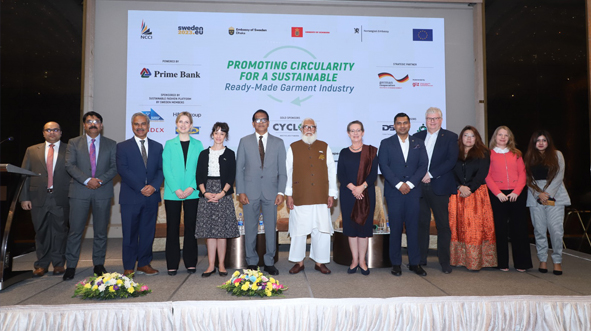$500m can be saved yearly by recycling textile waste: Experts

Experts said at an event that Bangladesh can save nearly $500 million annually in imports if all its textile waste was recycled locally.
Moreover, given the current situation, sustainability and the readymade garment (RMG) have become interdependent and sustainability and circularity are now no longer an option, but rather a reality.
They were speaking at a series of plenary sessions at the event titled “Promoting Circularity for a Sustainable RMG-sector in Bangladesh,” hosted by the Nordic Chamber of Commerce and Industry in Bangladesh in the capital.
The event was organized also in cooperation with the Nordic Embassies — Sweden, Norway, and Denmark — and the Delegation of the European Union in Bangladesh.
In his speech as the chief guest, Salman F Rahman, private industry and investment adviser to the prime minister, said that with the collaboration of the government, brands, buyers, and manufacturers, Bangladesh’s apparel sector is the safest sourcing destination.
Currently, the sector has 192 Leed-certified green factories, along with the highest-rated factory, which is the commitment of the manufacturers toward the environment.
The Bangladeshi RMG sector is producing products where 75% of cotton and 25% are from manmade fibre (MMF). As Bangladesh is the second largest apparel exporter, it is also the second largest producer of textile waste, he added.
Therefore, Bangladesh has a huge opportunity to develop the recycling sector.
He also said that a large amount of the waste is being exported, so Bangladesh should ban its export, which the government is already working on.
“However, recycling doesn’t mean that 100% recycled cotton can be used. It requires an overall technological advancement,” Rahman further said.
To do that, brands should ensure fair prices as pricing is still an issue. Moreover, the Nordic countries should fund the investment to enable R&D and technology.
In his speech, Faruque Hassan, president of BGMEA, said that aligning with the visions and strategies regarding circularity and sustainability, Bangladesh was showing a commitment to a cleaner future.
“Bangladesh RMG industry’s march toward environmental sustainability is unprecedented and unmatched anywhere in the world,” he added.
During the ambassadorial panel discussion, Charles Whiteley, ambassador and head of the delegation of the European Union, stressed the impact of upcoming policy developments regarding circularity and textile strategy in the EU which will affect Bangladesh.
On another panel discussion titled “Policy and Roadmap Ahead”, Commerce Ministry Additional Secretary Md Hafizur Rahman, BKMEA Vice-President Akhter Hossain Apurbo, BGMEA Director Abdullah Hil Rakib, Reverse Resources Head of Operations Mumit Hasan, discussed what policy and roadmap Bangladesh should follow.
NCCI President Tahrin Aman marked the welcome speech where Tahmrin Falyaz Murshid Kazi, DG, Multilateral Economic Wing, Ministry of Foreign affairs, spoke as a special guest.





Comment here